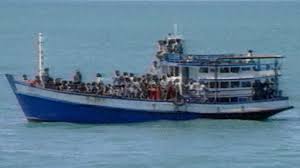The “sunk cost fallacy” and refugee policy
July 5th, 2014 | Published in Asylum; Refugees
 The cruelty of Australia’s refugee policies must have some explanation, and rational ones are thin on the ground. I have started wondering about the relevance of the sunk cost fallacy, and will return to this idea following an incomplete detour through policy directions and alternative possibilities.
The cruelty of Australia’s refugee policies must have some explanation, and rational ones are thin on the ground. I have started wondering about the relevance of the sunk cost fallacy, and will return to this idea following an incomplete detour through policy directions and alternative possibilities.
Refugee policy 2001+
Asylum seekers first got above my radar in August 2001 when John Howard, then Prime Minister, refused permission for Norwegian freighter MV Tampa, carrying 438 mostly Hazara refugees, to enter Australian waters. This display of mastery is said to have won him the election.
have won him the election.
Since 2001, I have worked directly and indirectly with asylum seekers and have kept some track of government policies, practices, and proposals including:
- Indefinite detention of children as well as adults;
- Bridging visas denying work rights and Medicare;
- Temporary protection visas denying family reunion;
- Pacific Solution, including offshore detention on impoverished islands;
- No advantage policy (compared with people in UNHCR camps) including freeze on processing of protection applications;
- Proposed people-swap with Malaysia, which didn’t actually get off the ground;
- Operation Sovereign Borders, including turning boats back to Indonesia;
- Processing asylum seekers at sea, with the intention of transferring them to Sri Lankan navy ships;
- Proposed amendments to the Migration Act such that people who apply for protection under the Convention against Torture could be rejected unless they demonstrate more than 50% chance of torture or death if returned to the country they fled; and,
- Proposed “national interest test” as a basis for denying permanent protection to any and all asylum seekers who arrive by boat.
Over the years many people have resisted such policies, and have had some success in holding back the tide as well as supporting asylum seekers through the legalistic minefield of refugee determination processes.
Alternative policies
Of the many courageous advocates, those who have proposed alternative policies include Julian Burnside QC, former Prime Minister Malcolm Fraser, and the folk at the ASRC (Asylum Seeker Resource Centre). Between them they have suggested:
- Substantially increasing our refugee intake;

- Processing people in Indonesia before they risk the treacherous sea voyage;
- Closing offshore detention centres;
- Restricting detention to a maximum of one month for preliminary health and security checks;
- Providing people with work rights and Medicare while their applications are processed; and,
- Settling recognised refugees in country regions of mainland Australia and/or Tasmania.
These proposals seem realistic, humane, less expensive (counted in billions) and could boost the economies of regional areas.
Why do humane possibilities fall on deaf ears?
So, why do they seem so unlikely to be implemented? Perhaps I’m too pessimistic, but don’t think so.
I can’t see how either the Coalition government, or Labor, could possibly pull back  from years of propaganda about illegal queue jumpers, people smugglers, protecting lives at sea, stopping the boats, sovereign entitlement to border protection, national interest, and unquestionable right to “decide who comes to our country and the circumstances in which they come” as John Howard, Prime Minister, proudly asserted in 2001.
from years of propaganda about illegal queue jumpers, people smugglers, protecting lives at sea, stopping the boats, sovereign entitlement to border protection, national interest, and unquestionable right to “decide who comes to our country and the circumstances in which they come” as John Howard, Prime Minister, proudly asserted in 2001.
How could either major party allow themselves to embrace the humane alternatives proposed by Burnside and others? They would have to admit being wrong! Think of the guilt and responsibility for damage done, to say nothing of the vast amounts of money squandered, and loss of credibility.
Which is where I come back to the idea of sunk costs.
Sunk cost fallacy as driver of policy
In economic terms, sunk costs are those already incurred that are unrecoverable. They represent what has been ‘sunk’ into a project. Ideally, future decisions are not influenced by sunk costs, but aversion to loss, and the need to rationalise the investment to date, can mean decision-makers barrel on in the same direction, accumulating further losses and making matters worse.
Such is the sunk cost fallacy – not open to reason, changes of heart, or moral alerts.
It is, in effect, a gambler’s problem.
The ‘sunk costs’ of refugee policies include:
- Financial – existing policies cost billions;
- Political – elections have ridden on the rhetoric;
- Social – large parts of Australian society have bought the rhetoric and might be understandably angry at a backflip, which would not only make it clear they had been manipulated, but would also make them complicit;
- Moral – politicians have taken the high moral ground in promoting their policies such that naysayers are dismissed as unpatriotic; and,
- Psychological – It would be more than a little challenging for any Minister, or any government, to acknowledge they had been wrong in relation to refugees. In fact, it seems pretty much inconceivable.
If, however, the sunk cost fallacy (or other similarly irrational processes) are significant in driving refugee policy, it may not be enough to propose cheaper alternatives. These may be rational, humane and achievable, but will fall on deaf ears. Indeed, they have fallen on deaf ears.
Clearing the roadblock to refugee justice may require grappling with and subverting irrational processes that are unresponsive to reason, appeals to compassion, allegations of immorality, or breach of international obligations.
Your comments are warmly invited…Joan Beckwith






Relevant article by Waleed Aly 11 July 2014 The Age:
http://www.theage.com.au/comment/tony-abbotts-harsh-treatment-of-asylum-seekers-is-the-same-old-story-20140710-zt23c.html
And one on similar theme from Michael Gordon 8 July 2014 The Age
http://www.theage.com.au/federal-politics/political-opinion/theres-no-turning-back-on-boats-for-morrison-20140707-3bizz.html
And one by Ben Saul on 4 July in Crikey
http://www.crikey.com.au/2014/07/04/australia-has-probably-broken-the-law-but-it-will-get-away-scot-free/